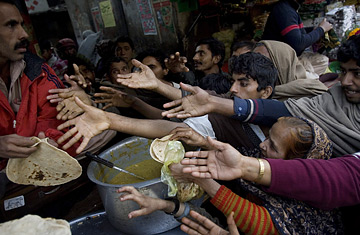
Pakistani men and women receive bread donated by anonymous worshipers next to a mosque in Lahore, Pakistan.
Pop quiz: name the most important issue for voters in the recent Pakistani elections. Was it the increase in terrorist attacks over the past year? President Pervez Musharraf's heavy-handed sacking of the country's top judges? Or the assassination of former Prime Minister Benazir Bhutto?
Actually, it was none of the above. According to former information minister Sheikh Rashid Ahmed, who spoke to the United Nation's news agency IRIN this week, his party, which is aligned with Musharraf, lost the parliamentary poll "because people were angry over the fact atta [flour] was not available, that food prices were high, and due to this they felt insecure." It's a familiar lament in Pakistan these days. "We are worried about terrorism and those other things, but first we are worried about basic needs," says Islamabad nurse Nithat, 24, as she shops in the capital's busy Aab Para market. "People want a person who can fix this problem."
Pakistanis have been grumbling about rising inflation for more than a year now, but in the past few months the sticker shock has grown much worse. Wheat prices have jumped by more than 20% since November, driven up by rising global prices as well as local hoarding ahead of the election and wheat smuggling into neighboring Afghanistan. The price of the gas that many Pakistanis use to cook with has also skyrocketed. January's inflation rate was nearly 12%, the highest in almost three years.
Basic foodstuffs are now so expensive and scarce that people have begun queuing for hours at government stores, where it is cheaper because of subsidies. When those same people lined up to cast their ballot last week, many of them apparently voted against Musharraf's ruling party. "It played a very important role," says Saeed Chaudhry, an economics lecturer at the National University of Modern Languages. "Hungry people are not happy people."
The U.N.'s Food and Agriculture Organisation says the world's food stocks are at record lows. And as the food shortage takes a tighter grip, it could start exacting a political toll in more countries than just Pakistan. The threat is particularly sharp in developing countries where food routinely accounts for more than half of household spending, compared to 20% or less in rich countries. As Chaudhry says: Hungry people are not happy people.
In Pakistan, where at least 25% of the country's 169 million people live in poverty, government subsidies have helped keep the prices of some items down. Islamabad spends some $2 billion on fuel subsidies, for instance. Sadly for ordinary Pakistanis and for the incoming government, the country's rapidly worsening fiscal deficit will make it harder to keep underwriting those costs. Continuing the subsidies will only worsen the country's budgetary woes. But if the government passes on the true cost of gas, the resulting increase will fuel inflation even more.
Mindful that the worst may be yet to come, the State Bank of Pakistan is ratcheting up interest rates, though it still expects inflation "to remain high" through the rest of 2008. That won't impress vegetable vendor Faiz Mohamed, 50, who says that Pakistan's economic success in the past few years has benefited only the elite. "A particular class has earned a lot from the investment, the new [cell] phones, all that," he says, from behind his worn metal scales. But, he says, "the poor man has become poorer."
